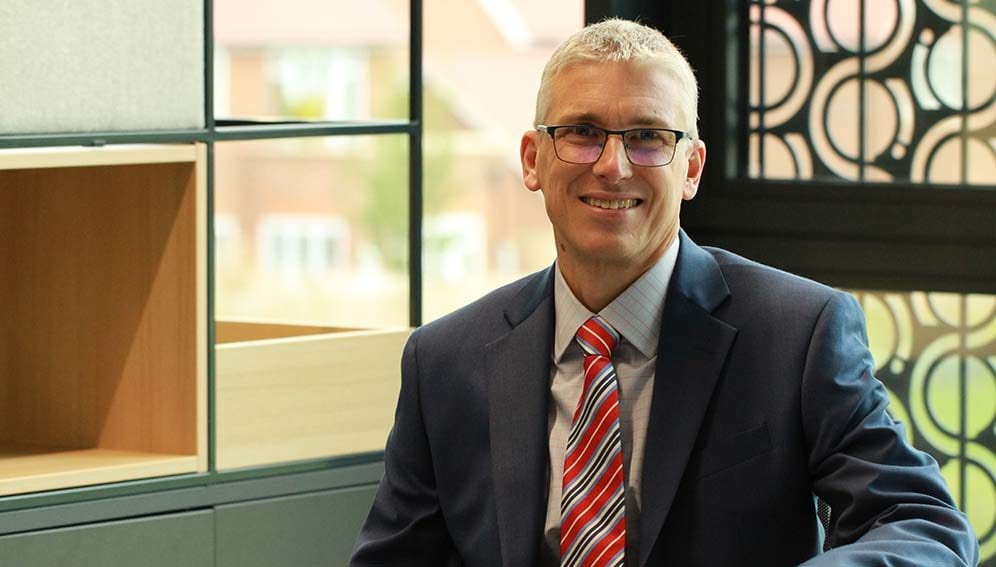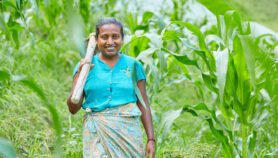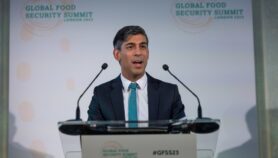23/10/20
Q&A: Objective science news needed now more than ever

By: Fiona Broom
Send to a friend
The details you provide on this page will not be used to send unsolicited email, and will not be sold to a 3rd party. See privacy policy.
The need for objective coverage of science is greater now than ever before, according to Daniel Elger, who took over last month as the chief executive of the Centre for Agriculture and Bioscience International (CABI, the parent organisation of SciDev.Net).
Elger said science journalism was vital so that good science could rise above a public discourse where “little premium” was put on facts.
“That’s important in itself, but it is also important if good science is going to rise above appearing to just be another opinion in this new public landscape, where little premium is put on facts and people aren’t necessarily questioning the veracity of evidence,” he told SciDev.Net in a wide-ranging interview as he started his tenure at the head of the intergovernmental organisation.
As well as SciDev.Net, CABI also runs programmes such as Plantwise, a global network of plant clinics, and produces CABI Agriculture and Bioscience, a peer-reviewed interdisciplinary research journal focussed on agriculture, food security, and the environment.
What are the urgent issues facing agriculture and biosciences?
The first obvious one is food security. With 800 million people undernourished worldwide, the adverse effects of COVID-19, and more broadly looking ahead to a need to feed 10 billion people by 2050 — that’s clearly one of the big challenges. The smallholder farmers who run more than 500 million small farms worldwide are going to be absolutely critical. CABI is focussed on the fact that around 40 per cent of crops grown worldwide are lost to pests and diseases, we have the mantra that we’re seeking to support smallholder farmers in growing more and losing less [to crop pests and diseases].
Food security is quite a complex issue, it’s a much bigger issue than just the supply of food, per se. If women farmers have access to the same resources as men, among smallholder farmers in particular, that would immediately reduce the number of hungry people worldwide by 150 million or so, which gives you an idea of some of the important social dimensions beyond food production.
“A lot of what we’re trying to do with the programmes now, in the next phase, is to work towards being able to predict the threats to the productivity and livelihoods of smallholder farmers.”
Daniel Elger, chief executive, CABI
After habitat loss, invasive species are actually the biggest threat to biodiversity worldwide, and are reckoned to cost the world economy about US$1.4 trillion every year. [CABI has] had a long tradition of working in the area of invasive species, we’ve got our Action on Invasives programme, which has looked at harnessing natural enemies and developing biological controls for invasive species.
What shape will CABI research take over the next five years? How will your background and experience drive the direction of this research?
I’m a complete convert to the value of innovation in producing change that can positively affect people’s lives. I’ve seen that in practice in my prior career in the healthcare sector. I think it’s extremely important that we maintain our commitment to innovation.
When we think about the science base of the organisation now, we think about both natural sciences and social sciences, because so much of what we are trying to do is to achieve impact not only at the level of farmers being able to grow more crops and improve their productivity, but embedding that in positive broader social change, particularly in some of the really important, cross-cutting themes — climate, gender equity, and other themes that are crucial to our member countries.
We’re looking to put more reliance on digital approaches. A lot of what we’re trying to do with the programmes now, in the next phase, is to work towards being able to predict the threats to the productivity and livelihoods of smallholder farmers, and put preventative measures in place for when threats do manifest. A lot of the research will be around ways to optimally achieve that.
You’ve joined the organisation during a pandemic; it’s a weird time with immense logistical challenges. How will you get to know the issues that face CABI’s member countries if global travel restrictions continue or field work is not possible?
This [digital] trend was happening anyway, the COVID-19 situation has accelerated that and put more of a premium on being able to use digital channels to reach people. For an organisation like us, which has 50 member countries, it’s very important that we keep closely in touch with those member countries and their agendas in everything we’re doing, so we’ve certainly brought digital approaches much more to the fore in that communication and in making sure that we’re staying engaged with what’s happening on the ground.
We do have the advantage that we are increasingly a decentralised organisation, so around half of our overall team work in the global South. That’s allowed us to function more effectively than if we were trying to do things on a very centralised basis.
We’ve seen a big increase this year in the use of a lot of our digital resources. Some of what we do in the field has been affected, because it relies on direct contact with our stakeholders and the smallholder farmers that we’re working with. But, we have managed to carry on a very significant part of our overall work and supplemented that with digital channels.
CABI’s mission is to make knowledge useful, to improve lives in the global South. What are some of the barriers that are stopping science from being accessible and usable, and how can access models be improved?
It’s not just about what research is available, but also the form in which that research is available. We seek to make the outputs of research available to people in the global South, particularly smallholder farmers. In many countries there’s very limited access to [agriculture information] extension services. Programmes like Plantwise, where people are able to access best practice knowledge and expertise directly and in a form that’s not adversely affected by considerations of literacy — that is very important.
Part of the attraction of digital approaches is that they can be targeted. Some of the groups who often have less access to research knowledge can be reached — digital approaches can be intrinsically quite attractive to youth, and youth are often marginalised or less targeted in conventional extension approaches. We can develop approaches that specifically target the needs of women, who again may not be well reached by other channels.
We’re committed to open access printables — we’ve just launched a new open access journal. We’ve also done a lot of work on access to data. There’s a lot of emphasis on South-South transfer of data and technology and on triangular cooperation, which have come to the fore in recent years.
Reliable information can be hard to come by in the ‘infodemic’ that has developed during this pandemic. What is the role of science news, and how do you think the science news landscape is changing?
Stepping back, thinking more broadly, it’s incredible how over the last ten years or so in the public discourse, there have been such big challenges to the whole notion of an evidence-based and rational approach to policymaking and to how we should think about the world, which I think is quite shocking in many respects. The need for objective coverage of science news is probably greater now than it has been ever — that’s not just about covering scientific developments and breakthroughs, it’s also vital that there are good sources that bring to public attention the scientific method, given the challenges to a rational view of the world.
It’s really important that journalism is critical and looks at the biases and the broader framework that impacts what questions we’re asking in science, who’s asking the questions, and how that science is being conducted. That’s important in itself, but it is also important if good science is going to rise above appearing to just be another opinion in this new public landscape, where little premium is put on facts and people aren’t necessarily questioning the veracity of evidence.
SciDev.Net obviously plays a great role, it’s particularly good that SciDev.Net provides more exposure for stories about scientific and technological innovations that originate from the global South. I’ve been enjoying the Africa Science Focus podcast series in recent weeks — that is a whole area of science and technology that is often pretty much ignored by other media.
We need to find people that have that skill of translating science in a way that the public can appreciate and understand and engage with. It all helps to aid the advancement of a rational discourse about scientific developments.














